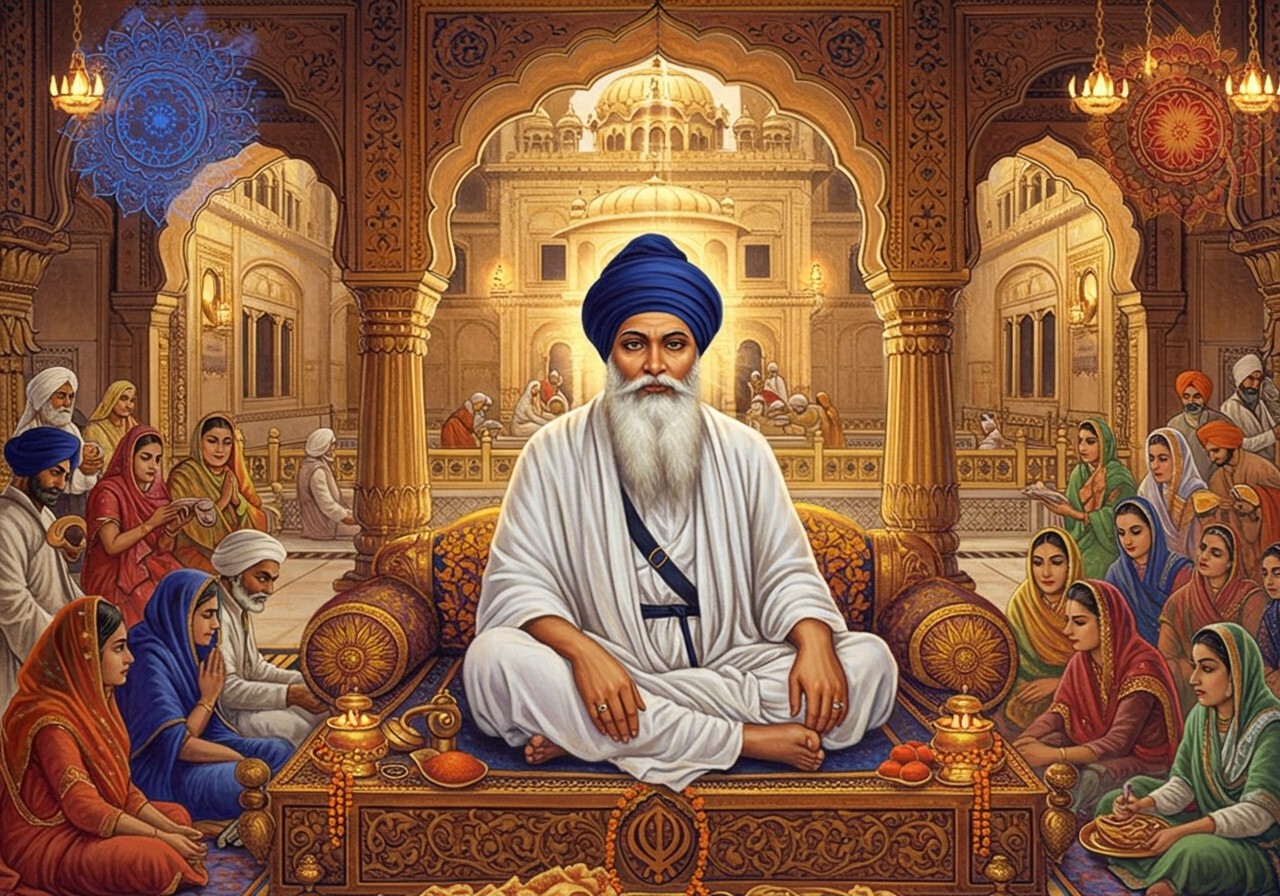
Guru Amar Das Ji, the third of the ten revered Sikh Gurus, remains a beacon of inspiration, whose life and teachings continue to illuminate the path for millions. Born in a period of profound socio-religious transformation, he played a pivotal role in shaping Sikhism into the distinct and profound faith it is today. His remarkable journey, significant contributions, and enduring legacy offer invaluable insights into the rich tapestry of Sikh history and philosophy.
Early Life and Upbringing
Guru Amar Das Ji was born on May 5, 1479, in the village of Basarke, near the sacred city of Amritsar, in Punjab. His father, Tej Bhan Ji, was a farmer and trader, providing for his family with diligence and honesty. His mother, Mata Lakhmi Ji, instilled in him deep-rooted values and a strong sense of spirituality. The family belonged to the Bhalla Khatri community. He married Mata Mansa Devi Ji, and they were blessed with two sons, Mohan Ji and Mohri Ji, and two daughters, Bibi Dani Ji and Bibi Bhani Ji. Notably, Bibi Bhani Ji later married Bhai Jetha Ji, who would become the fourth Sikh Guru, Guru Ram Das Ji. Before embracing Sikhism, Guru Amar Das Ji was a dedicated follower of Vaishnavite Hinduism, diligently observing Hindu rituals, undertaking pilgrimages, and observing fasts. These formative years as a householder, working in trade and agriculture, laid a strong foundation for his later spiritual awakening and the profound impact he would have on the world.
The Spiritual Awakening of Guru Amar Das Ji
At the age of 62, in 1541, Guru Amar Das Ji’s life took a dramatic turn. It was a transformative moment when he first heard the divine hymns of Guru Nanak Dev Ji, sung with deep devotion by Bibi Amro Ji, the daughter of Guru Angad Dev Ji (the second Sikh Guru). This encounter ignited a spark within him, drawing him towards the path of Sikhism. Inspired and deeply moved, he journeyed to Khadur Sahib to meet Guru Angad Dev Ji. This encounter became a turning point in his life.
Guru Amar Das Ji wholeheartedly dedicated himself to the service of Guru Angad Dev Ji and the growing Sikh community. His unwavering commitment to “Sewa” (selfless service) became a hallmark of his life. This devotion and his profound spiritual understanding led to his appointment as the third Sikh Guru in March 1552, at the age of 73, by Guru Angad Dev Ji himself.
Teachings and Philosophy
Guru Amar Das Ji’s teachings emphasized the core principles of equality, social justice, and selfless service – values that remain cornerstones of Sikhism today. He passionately preached against the divisive system of caste discrimination, striving to create a society where everyone was treated with equal respect and dignity. He championed the rights of women, challenging practices like “purdah” (the veiling of women) and “sati” (widow immolation). Moreover, he advocated for widows’ right to remarry, defying societal norms of the time.
One of his most significant contributions was the establishment of “Guru ka Langar,” the free community kitchen. In this sacred space, people from all walks of life, regardless of caste, creed, or social standing, could share a meal together, fostering a sense of unity and equality. He made it a practice that anyone seeking an audience with him must first partake in the Langar, emphasizing the importance of humility and shared humanity. This tradition continues to serve as a powerful symbol of equality and community within Sikhism.
Contributions to the Sikh Faith
Guru Amar Das Ji’s contributions were instrumental in formalizing Sikh practices and expanding the reach of the faith. He established Goindwal Sahib as a prominent pilgrimage center, further strengthening the Sikh community. Within Goindwal Sahib, he constructed the Baoli Sahib, a well with 84 steps, each representing a step towards spiritual enlightenment. It is believed that reciting the Japji Sahib on each step brings spiritual liberation. This act of devotion continues to draw pilgrims from all over, seeking blessings and spiritual solace.
To organize and propagate the teachings of Sikhism, Guru Amar Das Ji established the innovative “Manji” system. This system created 22 dioceses, or administrative regions, helping to spread the message of Sikhism far and wide. He also trained and appointed 146 apostles, known as Masands, to manage these regions and collect donations to support the burgeoning faith. Notably, 52 of these Masands were women, highlighting Guru Amar Das Ji’s commitment to gender equality and empowerment.
Beyond his organizational achievements, Guru Amar Das Ji also made significant literary contributions to Sikhism. He composed several beautiful and deeply spiritual hymns, including the revered “Anand Sahib,” which are now enshrined within the Guru Granth Sahib, the holy scripture of Sikhism. These hymns continue to inspire and uplift Sikhs around the world, offering solace, guidance, and a deeper connection to the divine.
Enduring Legacy and Influence
Guru Amar Das Ji’s legacy of progressive social reforms and profound spiritual guidance continues to resonate deeply within Sikhism and beyond. He designated Baisakhi, Maghi, and Diwali as special occasions for Sikhs to congregate and listen to the Guru’s wisdom, strengthening community bonds. His unwavering emphasis on devotion, humility, and selfless service played a crucial role in solidifying Sikhism as a distinct and vibrant faith, built on principles of equality and social justice.
Final Years and Passing
In his later years, Guru Amar Das Ji, with characteristic wisdom and foresight, appointed his son-in-law, Bhai Jetha Ji (who became Guru Ram Das Ji), as his successor, ensuring the continuity of the Guruship. He peacefully passed away on September 1, 1574. His teachings, however, continue to live on, inspiring generations to live a life of purpose, compassion, and service to humanity. Initiatives like the Langar and his staunch advocacy for women’s rights remain powerfully relevant even today, a testament to his timeless wisdom and enduring influence on society.
Shop Authentic Ritual Items for Sikh Practices at Poojn.in
At Poojn.in, India’s largest cultural goods and services store, we offer a wide selection of authentic items for Sikh ceremonies and daily practices. You can find everything you need to honor the legacy of Guru Amar Das Ji and enrich your spiritual journey.
- Rumalas for Guru Granth Sahib: Show reverence with pure cotton rumalas (cloth coverings) for the Guru Granth Sahib.
- Langar Utensils: Prepare Langar with traditional brass and copper utensils, upholding the spirit of service and community.
- Incense and Dhoop: Create a sacred atmosphere with traditional incense sticks and dhoop.
- Diyas and Wicks: Illuminate your ceremonies with pure ghee diyas and cotton wicks.
- Karah Prasad Ingredients: Prepare Karah Prasad with high-quality ingredients, ensuring purity and authenticity.
Poojn.in offers convenient online shopping and home delivery across India. Shop with us today and experience the convenience of finding authentic ritual items from the comfort of your home.
Exploring Further: Related Articles
- A Complete Guide to Laddu Gopal: 10 Essential Facts You Need to Know
- Understand Pancha Pratishtha and Establish Divine Presence
- Tulsi Peeth Acharya Ramchandra Das and His Enduring Influence
- Jyotiba Temple: A Spiritual Journey, History, Significance, and Travel Guide


